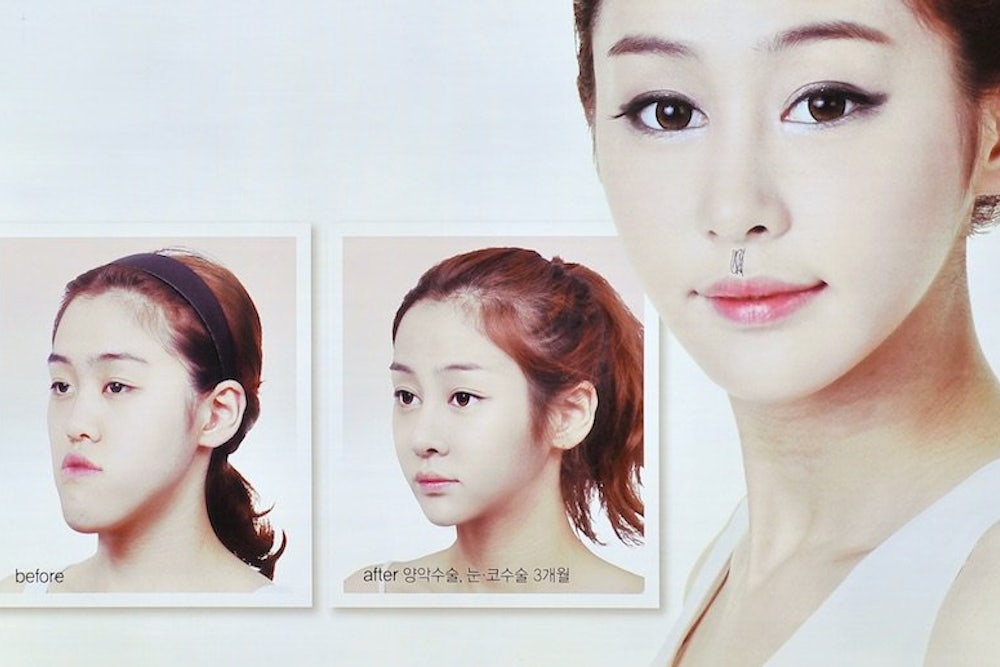Patricia Marx’s latest New Yorker essay takes the reader on a trip to Seoul, specifically its “Improvement Quarter,” to figure out why, “[b]y some estimates, the country has the highest rate of plastic surgery per capita in the world.” The central observation in Marx’s compelling, if occasionally exoticizing piece is that South Koreans aren’t discreet about these procedures. “Tall vertical signs” advertise clinics with names like “Small Face, Magic Nose, Dr. 4 Nose, Her She, Before and After, Reborn, Top Class, Wannabe, 4 Ever, Cinderella,” several college students described to Marx the lack of shame around getting work done:
I asked if they were ever tempted to lie and say that they hadn’t had surgery. “These days, the trend is to be open,” Park said. “The reason girls don’t lie is that we don’t feel guilty," Lee explained. “We are congratulated for having plastic surgery.”
Eunkook Suh, a Korean psychology professor, offered this cultural explanation: “One factor is that, in contrast to Western cultures, the external aspects of self (your social status, clothes, gestures, and appearance) versus the inner aspects (thoughts and feelings) matter more here. ... In Korea, we don’t care what you think about yourself. Other people’s evaluations of you matter more.”
Do other people’s evaluations matter less in the West, or are we just better at pretending we don’t care what others think?
On that note, consider this sentence from Marx’s piece: “We all want to look our best, but not since seventh grade had I been in the company of people for whom appearance mattered so much.” I immediately got what she meant: Middle school, as I remember it, was basically one long conversation among female friends about (imagined) chubbiness and least-favorite facial features. But does that mean these concerns vanish later in adolescence? Or is it that by high school, girls are socialized to hide the effort that goes into their looks?
If such a thing as true indifference were possible, I might be able to feel smug about my own culture for being less shallow. But at least when it comes to beauty, it’s not. The pervasive obsession here with “natural” beauty doesn’t eliminate concerns about our appearance, but leads women to deny having them. Thus, an entire news cycle was devoted, a few months back, to the question of why a middle-aged actress’s face looked different. And thus the cult, in fashion and beauty writing aimed at U.S. and U.K. audiences, of a different exoticized myth: the effortless Frenchwoman, thin despite a diet of croissants and cassoulet, smooth-skinned despite a smoking habit picked up in nursery school, and delightfully blasé about the fact that her husband (a politician or novelist) is having an affair. (Google “how to look French.” Step 8: “Keep slim.”)
I’m far from alone in my annoyance over the “natural beauty” myth. In an essay for Elle about the secrecy of women’s weight concerns, Marisa Meltzer took on “the notion that evolved girls simply don’t need to diet.”
The modern woman, after all, is that highly capable, have-it-all creature to whom career success, confidence, and effortless style—and, oh yeah, the yoga body and the eco-conscious, preservative-free diet—come naturally. She’s too damn smart and balanced to overeat in the first place. If anything, she’s already healthy and getting ever healthier. So juice fasts and Goop cleanses and barre classes? All fine as part of a vague ‘healthy lifestyle’ of ‘clean eating.’ Losing weight for your wedding day? Okay, you get a free pass on that one. But the daily slog of dieting—all that calorie counting and dessert skipping and cardio bingeing? That’s not at all chic.
This demand to be effortlessly attractive explains why the “cool girl” speech from Gillian Flynn’s Gone Girl hit such a nerve. In it, anti-heroine Amy rants about how “being the Cool Girl means I am a hot, brilliant, funny woman who adores football, poker, dirty jokes, and burping, who plays video games, drinks cheap beer, loves threesomes and anal sex, and jams hot dogs and hamburgers into her mouth like she’s hosting the world’s biggest culinary gang bang while somehow maintaining a size 2.” She is fed up with embodying this male fantasy, and reveals what kind of work goes into appearing effortlessly beautiful.
The West’s obsession with natural beauty, after all, isn’t about celebrating the beauty in everyone, but about praising only those who happen to be beautiful without having exceeded an arbitrary level of primping and exercise. It’s not that youthful appearance isn’t valued—it’s that to be beautiful is to actually be young, not to have found a skin cream or surgeon able to make you look as if you were.
And yet, denying or hiding cosmetic surgery is preferred to a proliferation of dangerous and medically unnecessary procedures. Not that they’re mutually exclusive: As Marx notes, “The United States has sagged to No. 6, though we still have the greatest total number of procedures.” But the thought of a grown-up beauty culture in any way resembling middle school is too nightmarish to contemplate, and I can’t quite summon the cultural relativism necessary to wish I lived in a society that “congratulated” women for having voluntary surgery. Still, it’s clear that a culture that shames women for going under the knife hasn’t solved the underlying concerns that inspires them to do so.
